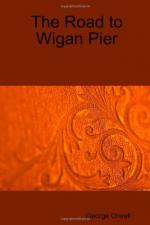
|
| Name: _________________________ | Period: ___________________ |
This test consists of 15 multiple choice questions and 5 short answer questions.
Multiple Choice Questions
1. With what, according to Orwell, is socialism inextricably connected?
(a) The idea of better housing and working conditions.
(b) The idea of machine production.
(c) The idea of workers' solidarity.
(d) The idea of overthrow of the rich.
2. How did unemployment affect the life of the married man?
(a) Unemployment raised the crime rate.
(b) Unemployment encouraged men to do housework.
(c) Unemployment drove men to drink.
(d) Unemployment did not make much difference in the home.
3. What famous line came from Greenwood's play "Love on the Dole?"
(a) "Oh, God, let me get out of here!"
(b) "Oh God, let me die!"
(c) "Oh God, why have y ou done this to me?"
(d) "Oh God, send me some work!"
4. What was one commodity that was less expensive in industrialized parts of England than the rest of the country?
(a) Telephones.
(b) Electricity.
(c) Cable.
(d) Fuel.
5. What did Orwell think would remind him that our age was not been a bad one to live in?
(a) The memory of slag heaps and coal mines.
(b) The memory of trees and playgrounds.
(c) The memory of working class homes and their families.
(d) The memory of working class heroes and their stories.
6. Why were the industrial towns in England so ugly and noxious?
(a) The modern methods of steel construction and smoke abatement were unknown.
(b) The people were so poor they threw trash in the streets and did not paint their houses.
(c) The government had given up helping this area of the country to deal with their filth.
(d) The mayors did not enforce local laws of trash and smoke abatement.
7. What did the Socialists think of the occupational centers?
(a) They believed the centers were there to keep the unemployed quiet and hopeful.
(b) They believed the centers should do more training.
(c) They believed the centers were run by Marxists.
(d) They believed the centers were brainwashing men.
8. What did Orwell find was the basis of the diet for families of the unemployed?
(a) White bread, margerine, corned beef, sugared tea and potatoes.
(b) White bread, butter, roast beef, sugared tea and carrots.
(c) White bread, butter, chipped beef, sugared tea and carrots.
(d) White bread, butter, tinny beef, sugared tea and potatoes.
9. What common feeling was shared by all of the different factions of the middle class in England?
(a) Hatred.
(b) Understanding.
(c) Confusion.
(d) Kindness.
10. What four words did Orwell discuss in detail as the reason for class distinctions?
(a) The upper-middle class cheat.
(b) The middle class lie.
(c) The lower class smell.
(d) The upper class steal.
11. What was a favorite refuge for the unemployed man in Wigan?
(a) The shopping areas.
(b) The movie theatre.
(c) The alleys.
(d) City Hall.
12. What did Orwell envision a home in the future?
(a) Forced air heating, larger grocery stores and mechanical doors.
(b) Invisible heaters, glass and steel furniture and fewer children.
(c) Glass and steel furniture, no libraries and more children.
(d) Electricity will run all functions in the home.
13. What did Orwell say was the primary preoccupation of a single unemployed man in winter?
(a) Finding work.
(b) Keeping warm.
(c) Finding food.
(d) Begging for money.
14. What did Orwell believe every unemployed man should be given if he wanted it?
(a) A patch of land and tools with which to grow his own food.
(b) A patch of land and a horse drawn wagon.
(c) A patch of land and one hundred pounds.
(d) A patch of land and a cow.
15. How was unemployment viewed by people in the late twenties and early thirties in England?
(a) As something that happened to you and from which you could escape.
(b) As something that happened to you and for which you were to blame.
(c) As something that you had coming to you for being so lazy.
(d) As something that happened because you did poorly at your job.
Short Answer Questions
1. What did Orwell cite as a reason class hatred seemed to be diminishing in the late 1930's?
2. Who did the work in the house of a married unemployed man?
3. What book did Orwell write telling of his experiences in London with the unemployed street people?
4. What was "scrambling for the coal?"
5. What did Socialism mean to the average, ordinary working man in England?
|
This section contains 859 words (approx. 3 pages at 300 words per page) |

|




